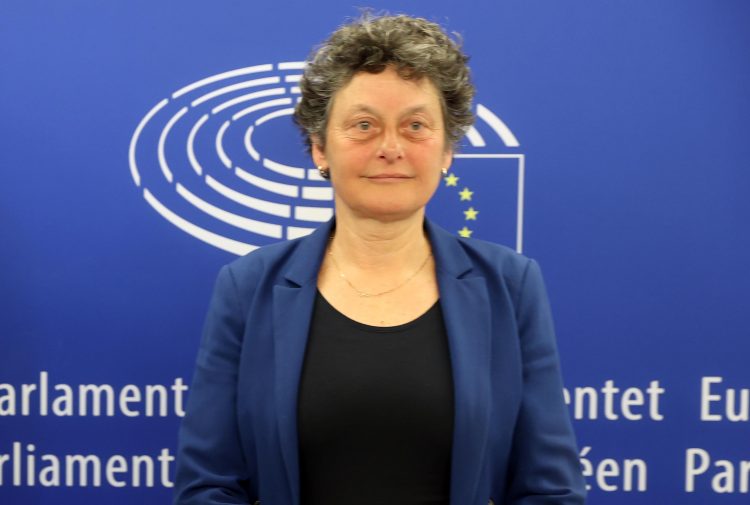
By giving in to the wishes of the HDZ BiH, the Office of the High Representative (OHR) is meeting the demands of this political party, European Parliament member Tineke Strik told Anadolu Agency, speaking about the amendments to the Bosnian Election Law of Bosnia and Herzegovina and the Constitution of the Federation entity (FBiH), which the international community's administrator in the country imposed on the election night.
Strik earlier commented on social networks on the High Representative's decision to impose the changes to the Bosnian Election Law and the Federation's Constitution, stressing that there is a “broad coalition” of over 20 representatives from the European, German, Dutch and French parliaments, urging High Representative Christian Schmidt to revoke the amendments.
In an interview with Anadolu Agency, Strik, who represents the Greens/EFA, spoke in detail about why Schmidt's move was wrong, how the Bosnian electoral legislation should be changed, as well as about the importance of the country's European path.
“As stated in the letter (to HR Schmidt), there are several reasons why 26 colleagues and I believe that Schmidt's move was disastrous and that it should therefore be revoked. Before looking at the content of the OHR proposal, one cannot simply change the election rules after voters have already cast their vote. In order to have free and fair elections, the framework in which these elections are held should be clear to voters in advance,” she stressed, adding that in order to bring about a possibility of electoral changes, it requires a “careful and democratic process.”
To ensure necessary reviews, Strik noted, civil society, political parties and observing bodies, such as the OSCE and the Venice Commission, should be part of this process as well.
The MEP also warned that by giving in to the wishes of the HDZ BiH, which is the largest Croat party in Bosnia and Herzegovina, the OHR has met the demands of this political party.
According to her, such changes “cement the ethnic divisions,” which should be overcome.
She also accused the political party of blocking the attempts of the country's democratisation.
“It (the HR's proposal) basically rewards them for bad behaviour and removes all incentives for a cooperative approach in future negotiations on constitutional reforms aimed at implementing the rulings of the European Court of Human Rights. Therefore, I am also concerned about the spillover effect of the crisis, which could be reflected in the behaviour of other actors in Bosnia and Herzegovina and in the Western Balkans in general. Because they actually see that this kind of behaviour can produce results. It is therefore crucial that Schmidt withdraws this law, to prevent a precedent for others”, stressed the parliamentarian.
Strik also noted that, with his move, Schmidt damaged his own reputation and he should ask himself whether he is still the right person for this job.
Speaking about the ways in which the electoral legislation in Bosnia and Herzegovina should be amended, Strik emphasised that the implementation of the judgments of the European Court of Human Rights should always be the basis of any change.
“Of course, it is not up to me as a member of the European Parliament to define how a country should change its electoral framework, but I can be very clear in the sense that any system changes that do not include the full implementation of the Sejdić-Finci, Zornić, etc. judgments will marginalize Bosnia and Herzegovina's chances to make significant progress on the way to the EU,” she said.
Commenting on the European Commission's recommendation for Bosnia being granted the EU candidate status, the MEP said it is first necessary to restore trust.
“The status of a candidate for Bosnia and Herzegovina is an important political sign of commitment to the citizens of BiH. I believe this holds the chance to spur reforms. For the EU, Russian aggression in Ukraine showed the vulnerability of stability on our continent. The rapid integration of the Western Balkans into the EU would bring stability to the EU itself, as it would prevent Russian influence. I think the EU leaders have understood this but it is important to translate it into concrete actions in order to truly show our renewed commitment,” she concluded.
According to her, young people in Bosna and Herzegovina are crucial for changes in the country.
“The country is currently stuck with the old status quo politicians who think along ethnic lines. They are stuck in the rhetoric that eventually resulted in the horrific war of the 1990s. After speaking with young people during my visits to Bosnia and Herzegovina, I really believe that this new generation can overcome this, that it is able to abolish ethnic divisions and work on reforms towards a country where everyone has equal rights and lives together in harmony,” she added.






Kakvo je tvoje mišljenje o ovome?
Budi prvi koji će ostaviti komentar!